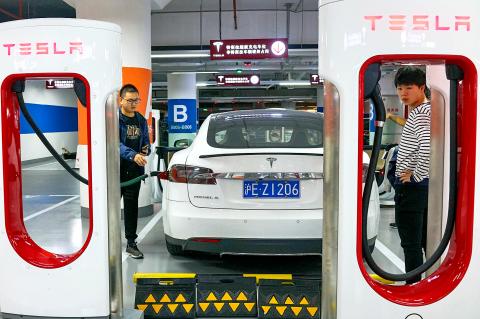Auto-parts suppliers shares jumped in Asian trading after the Wall Street Journal (WSJ) reported that Tesla Inc reached an agreement with Shanghai’s government to build a fully owned manufacturing facility in the city’s free-trade zone.
“As far as I know, there is no such agreement,” Guo Lei, an official at Shanghai’s Economy and Information Technology Commission who is in charge of new-energy vehicle projects, said in a telephone interview yesterday.
In a statement, Palo Alto, California-based Tesla reiterated that it is working with Shanghai’s government to explore local manufacturing.

Photo: AFP
Tesla signed a preliminary agreement with local authorities to produce cars in the city, a move that would help lower manufacturing and shipping costs, people familiar with the matter told Bloomberg News in June.
Two of those people said they were not aware of any material change when they were contacted yesterday about the Wall Street Journal report.
Tesla’s production plans in the world’s largest auto market are closely followed by industry watchers and investors as China accelerates electric-car development and works on a timeframe to phase out conventional-engine cars.
People familiar with the matter last month told Bloomberg that Chinese authorities are considering a proposal to allow overseas automakers to set up wholly owned electric-vehicle factories in free-trade zones, a move that would give Tesla a greater range of options.
Rules require foreign automakers to have joint ventures with local companies for domestic production.
Cheng Uei Precision Industry Co (正崴) advanced in Taipei trading yesterday.
In Shanghai trading, Ningbo Xusheng Auto Technology Co (寧波旭昇) led gains among suppliers, surging by the 10 percent daily limit.
Tianjin Motor Dies Co (天津汽車模具) rose as much as 7.3 percent in Shenzhen.
Beijing Zhong Ke San Huan High-Tech Co (北京中科三環) and metals supplier Dongguan Eontec Co (東莞宜安) also rose.
“We expect to more clearly define our plans for production in China by the end of the year,” Tesla said in a statement via WeChat.
“We continue to evaluate potential manufacturing sites around the globe to serve the local markets. While we expect most of our production to remain in the US, we do need to establish local factories to ensure affordability for the markets they serve,” it said.
Local production would make it easier for Tesla to access China’s auto-parts supply network and engineering talent pool at lower costs, accelerating sales growth and helping it compete with BYD Co (比亞迪) — China’s largest maker of electric cars — for market dominance, according to Bloomberg Intelligence.
The Chinese government has identified new-energy vehicles as a strategic emerging industry and aims to boost annual sales of plug-in hybrids and fully electric cars 10-fold in the next decade.
Last month, the Chinese government unveiled a set of emission rules, requiring almost all automakers to manufacture zero and low-emission vehicles starting in 2019.

Quanta Computer Inc (廣達) chairman Barry Lam (林百里) is expected to share his views about the artificial intelligence (AI) industry’s prospects during his speech at the company’s 37th anniversary ceremony, as AI servers have become a new growth engine for the equipment manufacturing service provider. Lam’s speech is much anticipated, as Quanta has risen as one of the world’s major AI server suppliers. The company reported a 30 percent year-on-year growth in consolidated revenue to NT$1.41 trillion (US$43.35 billion) last year, thanks to fast-growing demand for servers, especially those with AI capabilities. The company told investors in November last year that

Intel Corp has named Tasha Chuang (莊蓓瑜) to lead Intel Taiwan in a bid to reinforce relations between the company and its Taiwanese partners. The appointment of Chuang as general manager for Intel Taiwan takes effect on Thursday, the firm said in a statement yesterday. Chuang is to lead her team in Taiwan to pursue product development and sales growth in an effort to reinforce the company’s ties with its partners and clients, Intel said. Chuang was previously in charge of managing Intel’s ties with leading Taiwanese PC brand Asustek Computer Inc (華碩), which included helping Asustek strengthen its global businesses, the company

Taiwanese suppliers to Taiwan Semiconductor Manufacturing Co. (TSMC, 台積電) are expected to follow the contract chipmaker’s step to invest in the US, but their relocation may be seven to eight years away, Minister of Economic Affairs J.W. Kuo (郭智輝) said yesterday. When asked by opposition Chinese Nationalist Party (KMT) Legislator Niu Hsu-ting (牛煦庭) in the legislature about growing concerns that TSMC’s huge investments in the US will prompt its suppliers to follow suit, Kuo said based on the chipmaker’s current limited production volume, it is unlikely to lead its supply chain to go there for now. “Unless TSMC completes its planned six

Power supply and electronic components maker Delta Electronics Inc (台達電) yesterday said it plans to ship its new 1 megawatt charging systems for electric trucks and buses in the first half of next year at the earliest. The new charging piles, which deliver up to 1 megawatt of charging power, are designed for heavy-duty electric vehicles, and support a maximum current of 1,500 amperes and output of 1,250 volts, Delta said in a news release. “If everything goes smoothly, we could begin shipping those new charging systems as early as in the first half of next year,” a company official said. The new